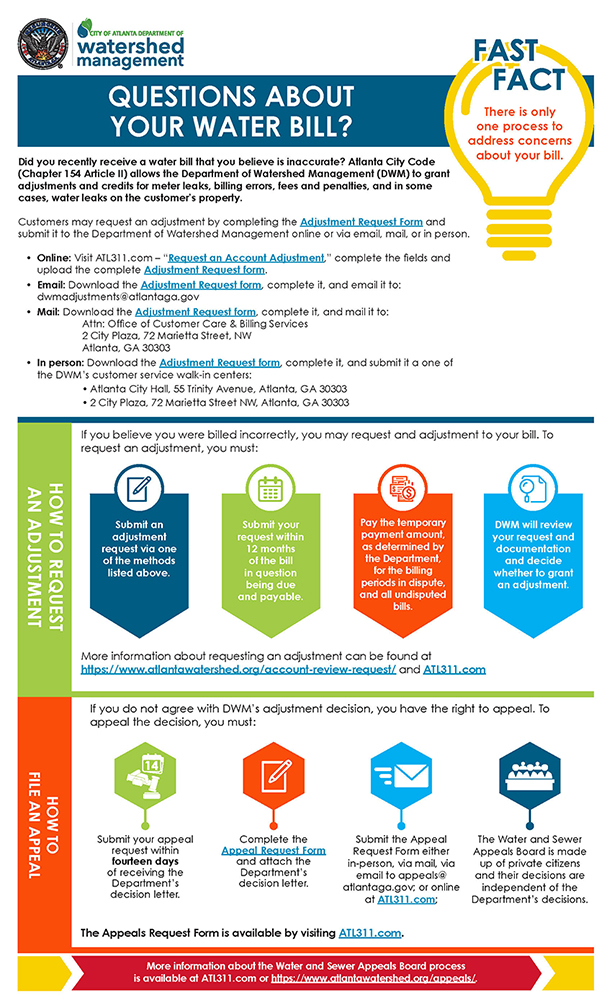How to Request an Account Adjustment
High water and sewer bill?
Did you recently receive a water bill that you think is too high or you believe is incorrect? If so, this page includes more information about your bill, about potential leaks in your home or property, and how you can request an account adjustment.
Understanding your bill
Common leak types
How to request an account adjustment
How to appeal an adjustment decision with the Water and Sewer Appeals Board
Bill payment assistance programs
What is a CCF? A cubic foot is a unit of volume equal to a cube one foot long on each side. One cubic foot of water equals 7.48 gallons. A “centum cubic foot” or “CCF” equals 100 cubic feet of water or 748 gallons.

What is a Base Charge? A base charge is the minimum charge for water and sewer service. This charge is $6.56 for water inside and outside the city as well as for sewer.
What are Usage Tiers? The City of Atlanta Department of Watershed Management calculates water and sewer bills using a tier structure: each tier corresponds to a different volume of usage. The tiers are:
Tier | Usage |
|---|---|
1 | 1-3 CCF |
2 | 4-6 CCF |
3 | 7+ CCF |
Each tier has a different cost for service. Additionally, there are different charges based on whether the property is inside the Atlanta city limits or outside the city limits.
Click here to review the most current Water and Sewer rates for the City of Atlanta.
The Department of Watershed Management offers a great tool to you at no charge that allows you to estimate your bill. Click here to view our Bill Calculator Tool.
The table below provides several examples of leaks and volume of water that type of leak may use. This table is not exhaustive and not accurate in every case: some leaks may use less water than described in the table, some may use more water.
| Leak Rate | Leak Rate (gallons per minute) | Leak Rate (gallons per month) | Leak Rate (ccf per month) |
|---|---|---|---|
| Slow drip | 0.1 | 4,320 | 5 |
| Leaky toilet flapper | 0.25 | 10,800 | 14 |
| Stuck faucet | 1.5 | 64,800 | 86 |
| Running toilet | 2.5 | 108,000 | 144 |
| Leaking pipe | 3 | 129,600 | 173 |
Not all leaks leave visible or audible evidence. For example, a running toilet will use a huge volume of water, but because that leak runs into the pipes it may not be easy to detect. Often plumbers will not be able to identify leaks, and a specialized “leak detection” company may be required to identify a leak, especially underground leaks that may exist in the service line between the meter and the building.
Intermittent versus Continuous Leak
Not all leaks are the same. Some leaks happen only once in a while. Leaks that happen sometimes but not others are called intermittent leaks, and often, but not always, coincide with the operation of a water-using device. Even though intermittent leaks may seem slow and not a cause for concern, over time these leaks can cause expensive usage of water. Common examples of intermittent leaks include:
- A faucet that leaks where the knob isn’t turned off completely or the control knob is not centered when turned off and the faucet drips.
- Flapper valves in the toilet tank degrade over time and don’t seal completely once in a while. These are typically slow leaks, and may only occur once in a while. Some flapper leaks can be heard while others may not be heard.
- Garden hoses with a sprayer on the end, and the water is not turned off at the spigot. These devices often leak at the sprayer end or can leak slowly where the hose is attached to the spigot.
Common Causes of Leaks |
|---|
| Outside faucet, garden hose or sprinkler system |
| Faucets leaking |
| Toilet valve not properly sealed |
| Washing machine leaking |
| Dishwasher leaking |
| Water-cooled air condition or heat pump |
| Toilet running |
| Ice maker leaking |
| Leak between the water meter and house |
| Water heaters |
Continuous leaks on the other hand, occur all the time, whether or not a water-using device is in use. They occur continuously and cause a huge spike in water usage. Common examples of continuous leaks include:
- Damaged pipes: Over time, pipe and pipe joints can deteriorate, causing leaks. Unfortunately, most pipe joints aren’t easily visible.
- Excess water pressure: High water pressure may feel nice, but excessive or uneven pressure can strain your pipes. Most pipes and faucets can only withstand up to a specific level of water pressure. Any extra pressure could cause leaks or even a pipe to burst.
- Trees: tree roots often find their way into water lines causing leaks. If you notice any new wet patches or sinkholes in your yard, experience a sudden drop in water pressure, or have trees growing very near your home, the water meter, or a service line, they may be causing leaks.
How to request an adjustment to your water and sewer account
In accordance with Atlanta City Code Chapter 154 Article II, the Department of Watershed Management (DWM) may grant adjustments and credits for water that flowed through a meter for the following reasons:
- Billing Errors
- Fees and Penalties
- Leaks (including some customer-side leaks and leaks resulting from vandalism)
- Meter Leaks
- Department Error
Customers may request an adjustment for one the reasons listed above by completing the Adjustment Request Form and submitting it the Department of Watershed Management in one of the following ways:
- Online: Visit ATL311.com – “Request an Account Adjustment,” complete the fields and upload the complete Adjustment Request form.
- Email: Download the Adjustment Request form, complete it, and email it to: dwmadjustments@atlantaga.gov
- Mail: Download the Adjustment Request form, complete it, and mail it to:
- In person: Download the Adjustment Request form, complete it, and submit it a one of the DWM’s customer service walk-in centers:
Attn: Office of Customer Care & Billing Services
2 City Plaza, 72 Marietta St.,
Atlanta, GA 30303
• Atlanta City Hall, 55 Trinity Ave., Atlanta, GA 30303
• 2 City Plaza, 72 Marietta St., Atlanta, GA 30303
Criteria to be eligible for an adjustment:
- Adjustment requests must be submitted online, via email, via mail, or in person.
- Adjustment requests must be requested in writing by the customer, using the form approved by the Department of Watershed Management.
- The Adjustment Request form must be fully complete, or the request will not be processed.
- Adjustment requests must be received by the Department within 12 months of the “Payment Due By” date on the bill that includes the relevant charges.
- Adjustment requests for Leaks must include satisfactory proof that the leak existed and was repaired. This may include receipts for paid invoices; receipts for parts or equipment; reports or photographs; evidence of vandalism such as a police report; or other evidence that, in the Commissioner’s discretion, supports an adjustment request. The Commissioner, at his/her discretion, may verify that repairs have been made. Invoices without proof of payment will not be accepted.
- The Customer MUST PAY the Temporary Payment Amount, as determined by the Commissioner, for the billing period(s) being disputed within twenty (20) days of receiving the Adjustment Acknowledgement Letter, or the adjustment request WILL NOT be processed.
- Submission of an adjustment request, receipt of a determination letter, or payment of the Temporary Payment Amount does not relieve the Customer of the obligation to pay undisputed past, current, or future charges for water and sewer services.
How does the adjustment process work?
Once the adjustment request is submitted, a member of DWM’s Customer Resolutions team will review the request and provide a written acknowledgement of the request. Once the request is investigated, a decision will be made and Customers will receive a written determination letter.
How to appeal an adjustment decision:
Customers that are dissatisfied with the adjustment decision have the right to appeal the decision to the City’s Water and Sewer Appeals Board (WSAB).
To appeal an adjustment decision, the customer must complete the Water and Sewer Appeals Board Hearing Appeal Request Form and submit it via the same methods for submitting an Adjustment Request.
The appeal form must be submitted by the Customer within fourteen (14) days of receiving the decision letter from the City. The Atlanta City Code (section 154-29(f)) defines when a customer “receives” the decision letter as:
Method of transmission | Date of Receipt |
|---|---|
| The first business day following transmission of the email | |
| First Class mail | The third business day after the letter was mailed |
| Certified mail | The date the confirmation receipt shows the letter was delivered |
For more information about the Water and Sewer Appeals Board or the appeals process please visit the WSAB webpage at https://www.atlantawatershed.org/appeals/.
Bill Payment Assistance Programs
- DWM offers the Care and Conserve Program that helps ratepayers prevent future high bills by providing assistance with plumbing problems and with the installation of water efficiency devices. More information is available at https://www.atlantawatershed.org/care-and-conserve/.
- The DWM operates a Senior Citizen Discount Program that offers eligible senior citizens a discount on water and sewer bills. More information is available at https://www.atlantawatershed.org/get-a-senior-citizen-discount/.
- Installment Payment Plans: Customers may be eligible to establish an installment payment arrangement by calling 311 or 404-546-0311 from outside of the Atlanta city limits.



